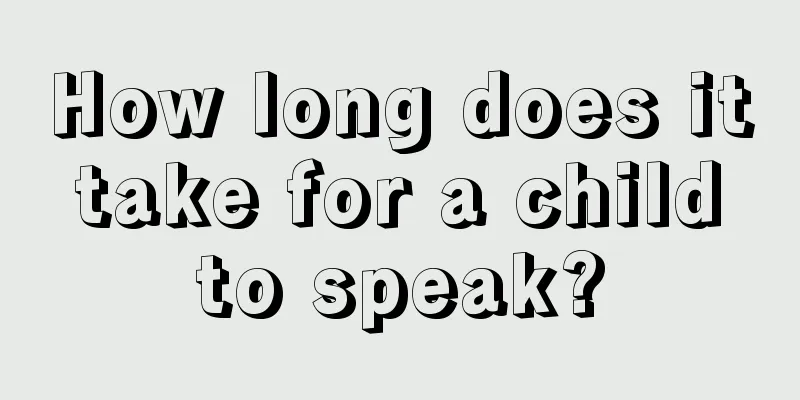The harm of eating adult food for babies

|
After the baby is 6 months old, mothers will complain that they do not have enough milk, and at this time they will add complementary foods to the baby. Many families feed their babies adult food when they see their babies start to grow teeth. This is absolutely not allowed. The taste of adult food varies from sweet to bland, which is not suitable for babies. In addition, the nutritional level of adult food is not enough to meet the growth needs of babies. This article provides you with the dangers of babies eating adult food. Let’s take a look. 1. Insufficient nutrition Because adult food is not as finely prepared as baby food, it is not easy for babies to absorb it; Because infancy is the period of fastest growth and development in a person's life, the demand for nutrition is relatively higher than that of adults, especially the demand for protein, iron, zinc, calcium and various vitamins, so refined nutrition is very important. 2 Unhealthy eating habits Adult food often contains more seasonings, which can easily make babies develop a habit of liking salty or sweet food, increasing the risk of cardiovascular diseases in the future; and too strong a taste can easily make babies develop a habit of being picky and partial eaters, leading to an unbalanced diet. Babies have a sensitive sense of taste, and natural and light food is the real delicacy for babies. Experts recommend starting complementary foods after your baby is 6 months old. The addition of baby food should be gradual according to the development of the baby's digestive tract and the growth of teeth, that is, from vegetable soup and rice soup to rice paste, vegetable puree, fruit puree, porridge, and meat puree, and then to soft rice, small pieces of vegetables, fruit and meat. If you find that your baby has severe diarrhea and there is often undigested food in his stool, it means that the complementary food is added too quickly. It is best to give your baby less salt, oil, sugar, etc., and do not add salt if the baby is under 1 year old. 3. Increase gastrointestinal burden Infants and young children do not know how to chew their food carefully when eating. They like to chew it twice and then swallow it. When babies are hungry, they may even stop chewing and just swallow the food whole. Undigested food will not only increase the burden on the stomach and intestines, but also cause indigestion in the baby. Furthermore, babies do not have proficient eating skills and the habit of swallowing food. When they encounter vegetables with coarse fibers or meat dishes that are difficult to chew, they may easily choke on the food, leading to vomiting or suffocation. 4. Early intake of condiments increases the risk of illness Adults' meals have a wide variety of flavors, and babies do like to eat them, but parents should think twice before feeding their babies. During the period of taste development, consuming foods with strong flavors can easily affect the baby's normal dietary preferences, and develop a preference for only one flavor, a sweet or salty habit, or a partial or picky eater. By then, it will be difficult to get your baby to eat light food. 5. Eating salt too early can cause developmental delay Adult meals have a heavy taste. If babies eat adult meals at an early age, the excessive salt intake will not only increase the baby's risk of high blood pressure, but also affect the baby's calcium absorption and cause developmental delay. It can easily increase the baby's chances of suffering from high blood pressure, obesity and other diseases when he grows up. TPS: Salt will increase the burden on the baby's kidneys, so it is not recommended for infants under 1 year old to eat salt. Moreover, many natural foods also contain a little salt, such as bananas, vegetables, etc. For children over 1 year old, you can try to gradually add a little less salt, especially in foods that children don’t like to eat, such as vegetable leaves and egg custard, add a little salt to seasoning. The recommended daily salt intake for babies under 7 years old should not exceed 3g. The maximum daily salt intake for adults is no more than 6g, and the threshold is relatively large. Adults generally have a heavy taste for salt, and if they are not careful, their salt intake will exceed the standard. If it happens that family members have a heavy taste for salt, it will be more harmful for the baby to eat adult food too early. |
<<: Is it OK for children to have a midnight snack?
Recommend
What medicine should my baby take for allergies? Recommended by authoritative experts
If your baby has an allergy, you should find the ...
What causes eye pain in children?
When children have eye pain, you should pay atten...
What are the symptoms of encephalitis in children?
Some children will have some acute infectious dis...
Causes of red bumps on children's bodies
Parents are always concerned about their children...
What to do if children have anorexia
Anorexia in children is a very distressing proble...
What to do if children have thinning hair
Children's physical health is one of the thin...
How should children with ADHD be treated?
Attention Deficit Hyperactivity Disorder (ADHD) i...
How can babies prevent tooth decay?
Everyone’s childhood can be said to be the happie...
What should I do if my five-month-old baby is zinc deficient?
When a baby suffers from zinc deficiency, there w...
Why is the stool thick in newborns?
New parents always lack certain experience in tak...
What should babies eat when they have oral ulcers and fever?
Having oral ulcers is a very painful thing, espec...
What is the matter with babies giving up milk?
In the early stages of a baby’s life, many mother...
How to protect children's throat
A good voice can not only allow you to have a ver...
One-month-old baby has milk curds when defecating
Babies usually need to defecate after birth. Pare...
Treatment of pancreatitis in children
Nowadays, the incidence of diseases among many ch...









